A collection of videos relating to the diagnosis and treatment of eye movement disorders. This collection includes many demonstrations of examination techniques.
Dan Gold, D.O., Associate Professor of Neurology, Ophthalmology, Neurosurgery, Otolaryngology - Head & Neck Surgery, Emergency Medicine, and Medicine, The Johns Hopkins School of Medicine.
A collection of videos relating to the diagnosis and treatment of eye movement disorders.
NOVEL: https://novel.utah.edu/
TO
| Title | Description | Type | ||
|---|---|---|---|---|
| 151 |
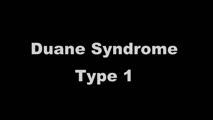 |
Typical Features of Duane Syndrome Type 1 | 𝗢𝗿𝗶𝗴𝗶𝗻𝗮𝗹 𝗗𝗲𝘀𝗰𝗿𝗶𝗽𝘁𝗶𝗼𝗻: This is a patient seen for vestibular complaints, who on exam, was found to have (unrelated to her vestibular symptoms) impaired abduction OS. In adduction, there was narrowing of the palpebral fissure OS, a result of glo... | Image/MovingImage |
| 152 |
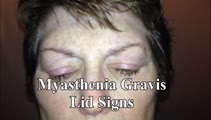 |
Typical Lid Signs (Cogan's Lid Twitch, Lid Hopping, Enhanced Ptosis) in Myasthenia Gravis | 𝗢𝗿𝗶𝗴𝗶𝗻𝗮𝗹 𝗗𝗲𝘀𝗰𝗿𝗶𝗽𝘁𝗶𝗼𝗻: This is a 60-yo-woman with MG who displays typical eyelid signs including Cogan's lid twitch, lid hopping (appreciated during horizontal smooth pursuit in this patient), and enhanced ptosis in accordance with Hering's law... | Image/MovingImage |
| 153 |
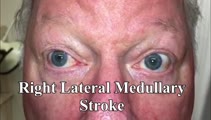 |
Unidirectional Nystagmus in Lateral Medullary Syndrome | This is a 70-yo-man who presented with acute vertigo. Examination demonstrated very mild spontaneous torsional nystagmus (towards the right ear) in primary (not seen well in this video), with robust downbeat-torsional (towards right ear) nystagmus in right gaze and (less robust) almost pure torsiona... | Image/MovingImage |
| 154 |
 |
Unidirectional Nystagmus Two Days After Onset of Vestibular Neuritis | Image/MovingImage | |
| 155 |
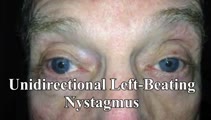 |
Unidirectional Vestibular Nystagmus | 60-yo-man with recurrent vertigo attacks - this video was taken during one of his typical attacks, and shows left-beating nystagmus that stayed left-beating in all directions of gaze, more in left gaze (in accordance with Alexander's Law), and less in right gaze. This pattern is more commonly seen w... | Image/MovingImage |
| 156 |
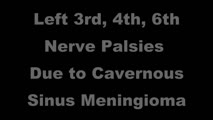 |
Unilateral 3rd, 4th, and 6th Nerve Palsies Due to Cavernous Sinus Meningioma | 𝗢𝗿𝗶𝗴𝗶𝗻𝗮𝗹 𝗗𝗲𝘀𝗰𝗿𝗶𝗽𝘁𝗶𝗼𝗻: This is a 50-year-old woman presenting with a partial 3rd nerve palsy (mild pupil involvement), partial 6th nerve palsy, and no clear incyclotorsion with downgaze, suggestive of additional 4th nerve palsy, all on the left... | Image/MovingImage |
| 157 |
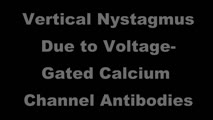 |
Upbeat and Downbeat Nystagmus Due to Anti-VGCC Antibodies | Seen here are two patients who presented with imbalance and vertical oscillopsia, the first with upbeat nystagmus, and the second with downbeat nystagmus. Both patients were found to have voltage-gated calcium channel antibodies in serum without evidence of systemic malignancy. The UBN patient had m... | Image/MovingImage |
| 158 |
 |
Upbeat Nystagmus & Ocular Flutter Due to Cerebellar Pilocytic Astrocytoma | This is a 20-year-old woman who was diagnosed with a cerebellar pilocytic astrocytoma at age 10 after presenting with severe headaches and hydrocephalus. She underwent incomplete resection and radiation therapy at that time. She experienced mild vertical oscillopsia in upgaze at baseline, and increa... | Image/MovingImage |
| 159 |
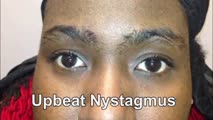 |
Upbeating and Gaze-evoked Nystagmus, V-pattern Esotropia from Bilateral 4th Nerve Palsies | Video example of a patient with upbeating and gaze-evoked nystagmus, V-pattern esotropia from bilateral 4th nerve palsies. | Image/MovingImage |
| 160 |
 |
Using Video Head Impulse Testing to Unmask Covert Saccades in Compensated Vestibular Veuritis | This is a 30-year-old woman who experienced the acute vestibular syndrome (prolonged vertigo for >24 hours, nausea, unsteadiness, spontaneous nystagmus, head motion intolerance) and was diagnosed with vestibular neuritis. This diagnosis was based on a positive head impulse test to the left (see Figu... | Image/MovingImage |
| 161 |
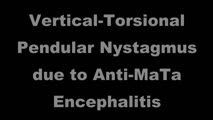 |
Vertical-Torsional Pendular Nystagmus and Convergence Spasm Due to Anti-MaTa Encephalitis | This is a 50-yo-woman with debilitating oscillopsia due to a high frequency (6 Hz) vertical-torsional pendular (quantitative eye movement recordings were performed) nystagmus. She also had intermittent double vision due to (organic) convergence spasm. Her nystagmus and spasm were thought to be relat... | Image/MovingImage |
| 162 |
 |
Vestibular Neuritis with a Peripheral Skew Deviation | 𝗢𝗿𝗶𝗴𝗶𝗻𝗮𝗹 𝗗𝗲𝘀𝗰𝗿𝗶𝗽𝘁𝗶𝗼𝗻: This is a 55-year-old hypertensive man who developed acute onset continuous vertigo and presented to the Emergency Department (ED) after several hours of symptoms. He was noted to have spontaneous nystagmus and had a nor... | Image/MovingImage |
| 163 |
 |
Vestibulocerebellum Lecture | A lecture on vestibulocerebellum. | Image/MovingImage |
| 164 |
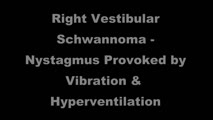 |
Vibration and Hyperventilation-induced Nystagmus from Vestibular Schwannoma | 𝗢𝗿𝗶𝗴𝗶𝗻𝗮𝗹 𝗗𝗲𝘀𝗰𝗿𝗶𝗽𝘁𝗶𝗼𝗻: This is a 50-yo-woman with imbalance, and with fixation removed on her examination (with Frenzel goggles), there was no spontaneous nystagmus. Using a handheld vibrator to vibrate the mastoids and vertex, there was a righ... | Image/MovingImage |
| 165 |
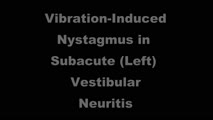 |
Vibration-Induced Nystagmus in a Patient with Vestibular Neuritis | 𝗢𝗿𝗶𝗴𝗶𝗻𝗮𝗹 𝗗𝗲𝘀𝗰𝗿𝗶𝗽𝘁𝗶𝗼𝗻: This is a 60-year-old man who experienced the sudden onset of vertigo, oscillopsia, imbalance, nausea and vomiting. He was seen in the emergency department within hours and had spontaneous right-beating (RBN) and torsiona... | Image/MovingImage |
| 166 |
 |
Visual Sensitivity | Image/MovingImage | |
| 167 |
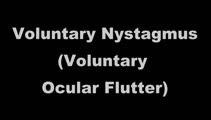 |
Voluntary Ocular Flutter | 𝗢𝗿𝗶𝗴𝗶𝗻𝗮𝗹 𝗗𝗲𝘀𝗰𝗿𝗶𝗽𝘁𝗶𝗼𝗻: This is a 45-yo-man with intermittent complaints of horizontal oscillopsia for 1 year. On examination, all classes of eye movements were normal, and neurologic examination was normal. MRI of the brain had been performed p... | Image/MovingImage |
| 168 |
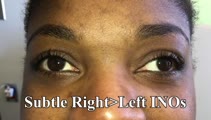 |
Wall-eyed Bilateral INO in Caudal Midbrain Lesion | This is a 30-yo-woman with the relatively acute onset of diplopia. There was a large angle exotropia, very subtle lag of the adducting saccades OD>OS, suggestive of bilateral INOs. This was best seen with rapid horizontal saccades, and a lesion involving bilateral MLFs in the caudal midbrain was dem... | Image/MovingImage |
| 169 |
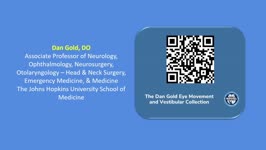 |
Wall-eyed Bilateral Internuclear Ophthalmoplegia (WEBINO) in MS | This is a young woman with a years-long history of multiple sclerosis who presented 2 years prior to this examination with complaints of oscillopsia (which was due to spontaneous upbeat nystagmus), as well as diplopia (which was due to bilateral internuclear ophthalmoplegia, INO). ; ; At the time of... | Image/MovingImage |
| 170 |
 |
Wallenberg Syndrome in MS | 𝗢𝗿𝗶𝗴𝗶𝗻𝗮𝗹 𝗗𝗲𝘀𝗰𝗿𝗶𝗽𝘁𝗶𝗼𝗻: 30-yo-woman with MS presenting with acute vertigo and vertical diplopia. Examination demonstrated several aspects of the Wallenberg syndrome (her acute demyelinating lesion was in the left lateral medulla): ipsilesional (... | Image/MovingImage |
| 171 |
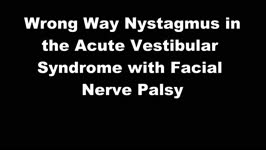 |
Wrong Way Nystagmus - Cranial Nerve 7 and 8 | Image/MovingImage | |
| 172 |
 |
A 'Canal Jam' During Head Impulse Testing in a Patient With Horizontal Canal BPPV | A 70-year-old man reported brief episodes of positional vertigo. Ten years prior, he had undergone gamma knife radiosurgery for a vestibular schwannoma at the left cerebellopontine angle. Video head impulse testing (vHIT) showed reduced gains and corrective saccades in the planes of the left horizon... | Image/MovingImage |
| 173 |
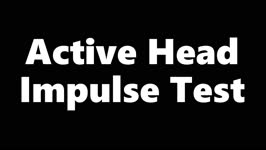 |
Active Head Impulse Test | Active head impulse test (HIT): instruct the patient to fix their eyes on the camera and turn their head 20o to the right/left, and then make a rapid movement toward the midline to align their head with the camera again, keeping their eyes fixed on the camera throughout. A simple instruction is to a... | Image/MovingImage |
| 174 |
 |
The Acute Vestibular Syndrome with Dysarthria, Dysphagia, Dysphonia, Hemi-ataxia, and Saccadic Dysmetria Due to the Lateral Medullary (Wallenberg) Syndrome | 𝗢𝗿𝗶𝗴𝗶𝗻𝗮𝗹 𝗗𝗲𝘀𝗰𝗿𝗶𝗽𝘁𝗶𝗼𝗻: This is a 50-year-old woman with the acute onset of vertigo, dysarthria, dysphagia and dysphonia/hoarseness (nucleus ambiguus), ptosis and imbalance. Her examination localized to a left lateral medullary (Wallenberg) synd... | Image/MovingImage |
| 175 |
 |
The Acute Vestibular Syndrome with Skew Deviation, Gaze-evoked Nystagmus, and Bilaterally Abnormal Head Impulse Testing Due to AICA Stroke | This is a 60-year-old man with the acute onset of prolonged vertigo and nystagmus, consistent with the acute vestibular syndrome (AVS). HINTS (Head Impulse, Nystagmus, Test of Skew) exam demonstrated a central pattern: 1) Head impulse test (HIT) was abnormal to the right and to the left. An abnormal... | Image/MovingImage |
